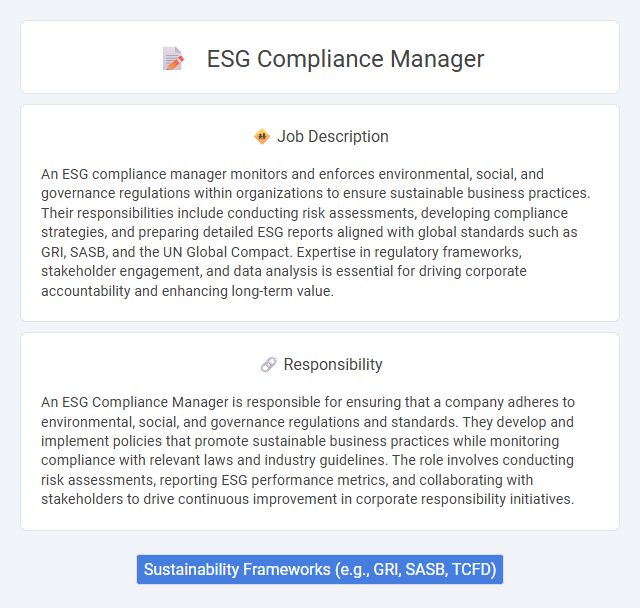
An ESG compliance manager monitors and enforces environmental, social, and governance regulations within organizations to ensure sustainable business practices. Their responsibilities include conducting risk assessments, developing compliance strategies, and preparing detailed ESG reports aligned with global standards such as GRI, SASB, and the UN Global Compact. Expertise in regulatory frameworks, stakeholder engagement, and data analysis is essential for driving corporate accountability and enhancing long-term value.
Individuals with strong analytical skills and a passion for sustainability will likely be well-suited for an ESG compliance manager role. Those who thrive in detail-oriented environments and can navigate complex regulatory frameworks probably have a higher chance of success. Candidates with excellent communication abilities and a commitment to ethical practices may find this position aligns closely with their strengths.
Qualification
An ESG Compliance Manager must possess a strong background in environmental, social, and governance frameworks, typically supported by a degree in sustainability, environmental science, or business administration. Professional certifications such as CFA ESG Investing, SASB, or GRI Standards demonstrate expertise in sustainability reporting and compliance. Proven experience in risk management, regulatory adherence, and stakeholder engagement is essential to effectively ensure organizational compliance with evolving ESG standards.
Responsibility
An ESG Compliance Manager is responsible for ensuring that a company adheres to environmental, social, and governance regulations and standards. They develop and implement policies that promote sustainable business practices while monitoring compliance with relevant laws and industry guidelines. The role involves conducting risk assessments, reporting ESG performance metrics, and collaborating with stakeholders to drive continuous improvement in corporate responsibility initiatives.
Benefit
An ESG compliance manager position likely offers significant benefits, including enhanced career growth opportunities within sustainability and regulatory fields. The role may provide the chance to influence corporate responsibility practices, increasing professional value in an evolving market. Companies may also offer competitive compensation packages and access to specialized training.
Challenge
The ESG compliance manager role likely faces significant challenges in navigating evolving regulatory frameworks and ensuring that corporate practices align with stringent environmental, social, and governance standards. There is a high probability that managing stakeholder expectations while driving sustainable initiatives requires balancing complex, sometimes conflicting, priorities. Adapting to rapidly changing sustainability metrics and reporting requirements may further complicate effective compliance management.
Career Advancement
ESG Compliance Managers oversee environmental, social, and governance regulations, ensuring corporate adherence to sustainability standards and ethical practices. Mastery in regulatory frameworks and advanced risk management opens pathways to executive roles such as Chief Sustainability Officer or Director of Corporate Responsibility. Developing expertise in ESG reporting, stakeholder engagement, and strategic compliance enhances career growth in the expanding field of sustainable business management.
Key Terms
Sustainability Frameworks (e.g., GRI, SASB, TCFD)
An ESG Compliance Manager specializes in implementing and monitoring sustainability frameworks such as GRI, SASB, and TCFD to ensure organizational adherence to environmental, social, and governance standards. This role involves analyzing corporate sustainability data, preparing detailed compliance reports, and guiding strategic initiatives that align with global ESG benchmarks. Expertise in sustainability reporting standards improves transparency and drives responsible business practices aligned with investor and regulatory expectations.
 kuljobs.com
kuljobs.com